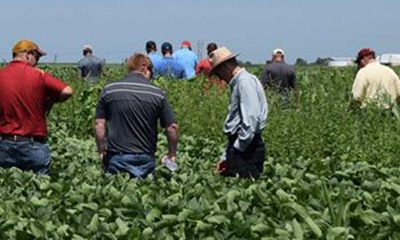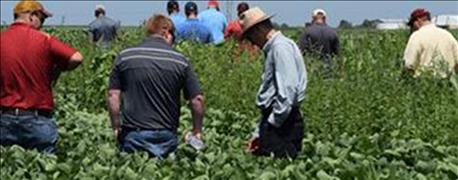
More than 150 farmers and agribusiness professionals took part in Weeds Week events around the state this summer. The 2016 Weeds Week program, held July 18 to 22, was the second year Iowa State University Extension has offered the event. The program this year was held at five locations across the state. It included presentations by ISU specialists on weed identification, evaluating herbicide sites of action, and developing long-term, field-specific weed management plans as well as field plot tours.

LOOKING FOR ANSWERS: Iowa farmers are seeking better answers as weed control gets tougher. Weed resistance to certain herbicides is an increasing problem. That’s why there’s renewed interest in how to effectively manage weeds.
This year’s program at Weeds Week events included an additional component to help farmers evaluate and plan for successful weed control. “Weeds Week encourages farmers to make long-term weed management plans,” says Joel DeJong, ISU Extension field agronomist in northwest Iowa. “And farmers who made changes this year based on what they learned last year are generally seeing good results in 2016 weed control, thanks to these changes.”
Designing an effective herbicide program for your fields
“This year at Weeds Week meetings we took people through the actual process of designing effective weed management programs. We provided the participants the time to develop their own weed control strategy based around their major weeds of concern,” says Virgil Schmitt, an ISU Extension field agronomist.
Morgan and Evan McCarty are brothers who’ve attended a Weeds Week program each of the past two years. They farm with their father near Royal in northwest Iowa, and do all of the spraying of herbicide applications to their corn and soybean fields. Morgan and Evan decided to attend the Weeds Week program to learn more about using multiple sites of action and scouting.
“We realized that Roundup isn’t the cure, and wanted to learn about different herbicide programs,” says Evan.
Plan 2 to 3 years ahead to properly schedule herbicides
At the 2015 and 2016 Weeds Week programs, Evan and Morgan learned about planning two to three years in advance to hit different herbicide groups, and not to use the same family of herbicides every year. Evan says they were also told about the economic impact of ignoring resistance and not managing weeds early on.
“Two years in a row, we heard that you should spend more money on weed control early on to avoid additional costs later, but we didn’t act on it,” says Evan. "After we attended Weeds Week last year, we decided to take the ISU Extension weed management specialists’ advice and we took action earlier in the season this year, to avoid late-season weed consequences.”
Changes paid off, these farmers have good weed control in 2016
Morgan says the changes have paid off, and they are seeing good weed control this year. “We are seeing good results from the management changes we made over the past year,” notes Morgan. “We’ve had a couple issues with giant ragweed and waterhemp, but besides that, our fields look really clean.”
The ISU Weeds Week program also allowed farmers and agribusiness professionals to discuss their specific weed problems with one another and gave them the opportunity to have ISU Extension and Outreach specialists answer their questions.
“We provided opportunities for participants to identify factors that would influence the effectiveness of a herbicide program, whether or not a single application would be effective, and non-chemical techniques that impact weed management,” says Schmitt. “We then used their answers as the jumping-off point to address some of those issues. People learned from each other, as well as from ISU Extension and Outreach staff.”
About the Author(s)
You May Also Like




